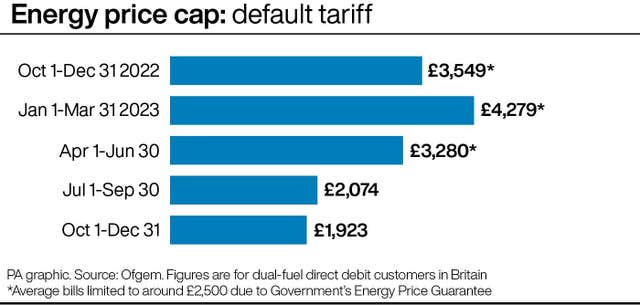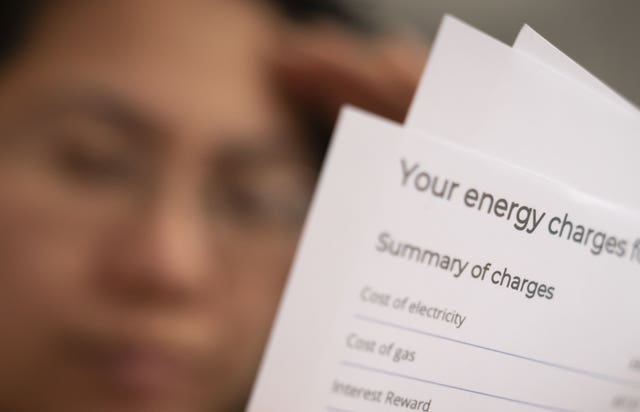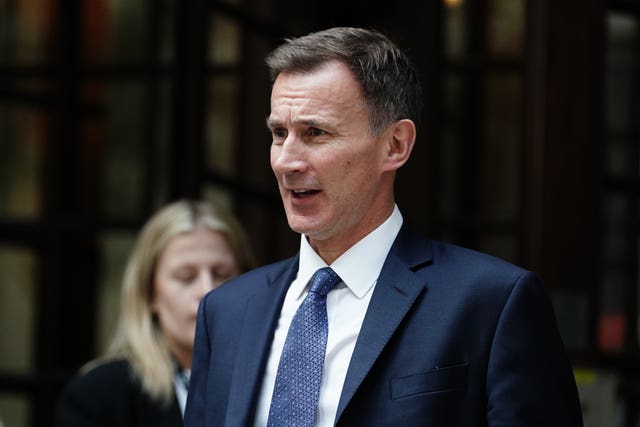
Despite falling wholesale energy prices making their way through to bills, households are still facing eye-watering costs that remain around 50% higher than two years ago.
What is Ofgem’s price cap and what does it all mean for household bills?
What is Ofgem’s price cap?
The energy price cap was introduced by the Government in January 2019 and sets a maximum price that energy suppliers can charge consumers in England, Scotland and Wales for each kilowatt hour (kWh) of energy they use.
 (PA Graphics)
(PA Graphics)
It aims to ensure that prices for customers on default energy tariffs are a fair reflection of the cost paid by suppliers for wholesale energy, and that the profit firms make is capped.
Ofgem sets its cap every three months as the average amount paid by the typical household.
It is important to note though that Ofgem’s cap does not set a maximum amount for the actual bill households receive – those who use more than the average amount will pay more, and those who use less will pay less.
READ MORE: Energy price cap: Ofgem slashes maximum bill to £1,923
Energy is regulated separately in Northern Ireland, where the Utility Regulator has begun a regular review of prices.
Why is Ofgem’s price cap falling?
The fall reflects recent drops in wholesale energy prices – the amount energy firms pay for gas and electricity before supplying it to households.
Last winter, the average household energy bill was £2,500 per year, thanks to the Government’s separate Energy Price Guarantee scheme.
 Lower wholesale prices are not always passed on to consumers (Danny Lawson/PA)
Lower wholesale prices are not always passed on to consumers (Danny Lawson/PA)
However, households were also getting £66 per month taken off their bills by the Government.
The average household was therefore paying around £141 per month after the discount over the winter months if they were on a direct debit payment plan.
What is this winter looking like in terms of energy bills?
If the forecasts are accurate, households using the same amount of energy this winter will be paying around £160 per month.
Consultancy firm Cornwall Insight currently believes the typical bill will rise again in January by around £150 a year.
It does not expect energy prices to return to pre-Covid levels before the end of the decade at the earliest.
And it warned that prices remain subject to wholesale market volatility, with the UK’s reliance on energy imports meaning that geopolitical incidents could continue to have a significant impact.
Citizens Advice has also warned that the average household can actually expect to pay slightly more in the coming winter than they did between January and March 2023 if current forecasts hold.
Its research suggests disabled people, single parents and low-income households earning less than £29,000 will be the hardest hit this winter.
Citizens Advice is calling on the UK Government to do more to help people on the lowest incomes, such as providing additional support through the Warm Home Discount.
 Chancellor Jeremy Hunt said in the spring Budget that energy costs for prepayment households would be brought in line with those who pay by direct debit (Jordan Pettitt/PA)
Chancellor Jeremy Hunt said in the spring Budget that energy costs for prepayment households would be brought in line with those who pay by direct debit (Jordan Pettitt/PA)
Will the falling price cap mean the return of switching?
Cornwall Insight has said it hopes to see the reappearance of more competitive fixed-rate energy tariffs as prices begin to stabilise, meaning it could soon be worthwhile for consumers to consider switching again.
Unlike variable tariffs, they are unaffected by the cap.
Consumer groups and regulators say that could be good news for consumers, but warn that such deals will not suit all circumstances, and anyone who locked into a fixed deal would miss out on falling variable prices.
What if I’m not on a standard default tariff?
Chancellor Jeremy Hunt confirmed in the spring Budget that energy costs for prepayment households would be brought in line with those who pay by direct debit.
This means the cap is the same for both forms of payment.
However, those who pay via cash, cheque or bank transfer, usually every three months, will pay significantly more.
What have the politicians said?

Rishi Sunak has said the Ofgem energy price cap announcement is “really good news” for families.
The Prime Minister told the BBC: “Actually today is really good news for families up and down the country with a reduction in the energy price cap that’s going to reduce, on average, a typical family’s energy bill by about £150, easing the burden on the cost of living.
“And we took decisive action after Putin’s illegal war to help families by imposing a windfall tax on energy companies, using that money to provide about £1,500 of support to a typical household, but I know things are still tough and that’s why we are working night and day to bring down inflation, so that the money in people’s pockets can go further.”
READ MORE: A third of Scots blame energy regulators for a keeping bills too high
Scottish Government Energy Secretary Neil Gray said: “With average energy bills still nearly twice what they were two years ago, this small reduction will be of little comfort to the many thousands of households who continue to face significant hardship – particularly as we head into the winter months and people need a warm home most.
“The Scottish Government is continuing to do everything we can within our limited powers to support as many people as possible. We trebled our Fuel Insecurity Fund to £30 million this year, and the bulk of this is set to be distributed throughout autumn and winter so that those who are most at-risk of self-rationing or self-disconnecting get tangible help when they need it most.
“Only the UK Government has the fiscal and policy levers with which to truly address this unacceptable situation. First, by providing meaningful, targeted support to those who will need it most – including the introduction of a social tariff. Second, by finally making the necessary energy market reforms to permanently break the link between the price of electricity and the cost of gas and ensure the people of such an energy-rich nation as Scotland do not endure this situation again.”



Why are you making commenting on The Herald only available to subscribers?
It should have been a safe space for informed debate, somewhere for readers to discuss issues around the biggest stories of the day, but all too often the below the line comments on most websites have become bogged down by off-topic discussions and abuse.
heraldscotland.com is tackling this problem by allowing only subscribers to comment.
We are doing this to improve the experience for our loyal readers and we believe it will reduce the ability of trolls and troublemakers, who occasionally find their way onto our site, to abuse our journalists and readers. We also hope it will help the comments section fulfil its promise as a part of Scotland's conversation with itself.
We are lucky at The Herald. We are read by an informed, educated readership who can add their knowledge and insights to our stories.
That is invaluable.
We are making the subscriber-only change to support our valued readers, who tell us they don't want the site cluttered up with irrelevant comments, untruths and abuse.
In the past, the journalist’s job was to collect and distribute information to the audience. Technology means that readers can shape a discussion. We look forward to hearing from you on heraldscotland.com
Comments & Moderation
Readers’ comments: You are personally liable for the content of any comments you upload to this website, so please act responsibly. We do not pre-moderate or monitor readers’ comments appearing on our websites, but we do post-moderate in response to complaints we receive or otherwise when a potential problem comes to our attention. You can make a complaint by using the ‘report this post’ link . We may then apply our discretion under the user terms to amend or delete comments.
Post moderation is undertaken full-time 9am-6pm on weekdays, and on a part-time basis outwith those hours.
Read the rules here